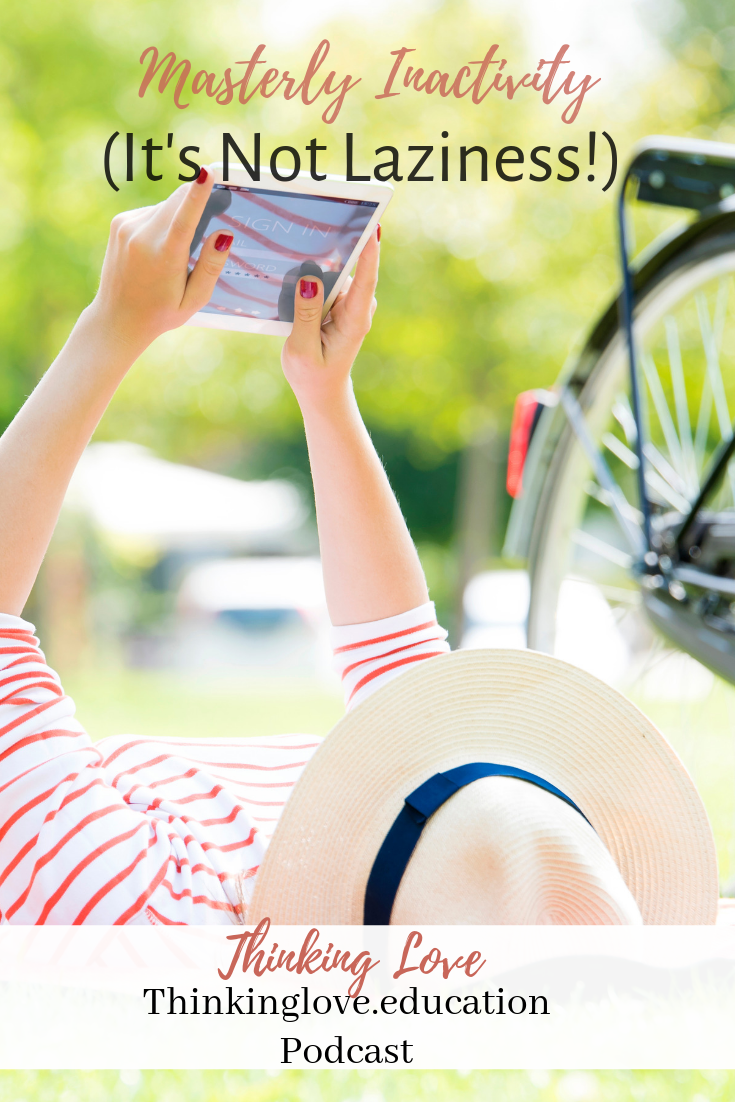On today's episode, we're talking about Masterly Inactivity. That's a Charlotte Mason phrase that encompasses how we interact with our children, even when they're very young.
"When we recognise that God does not make over the bringing up of children absolutely even to their parents, but that He works Himself, in ways which it must be our care not to hinder, in the training of every child, then we shall learn passiveness, humble and wise. We shall give children space to develop on the lines of their own characters in all right ways, and shall know how to intervene effectually to prevent those errors which, also, are proper to their individual characters." School Education, page 35
It seems like a completely contradictory phrase. In our western culture, the world, to be inactive is viewed as laziness and is frowned upon. But, upon closer look, what Charlotte Mason means by "masterly inactivity" is that parents should have the wisdom to not get involved when they don't need to; stepping back and knowing what's going on, but understanding that you don't always need to interfere with what they're doing. A very wise and knowing mother will know what her children are up to, who is coming and going, and what they will do next, because she is so wise and so aware.
Sometimes people here "masterly inactivity" and view it only has inactivity. They forget that it's also supposed to be masterly. This allows them to learn for themselves, and even to fail.
Charlotte Mason said, "There is no education but self-education." If we are too much with our children, we are not allowing the process of self-education to occur.

Show notes
This post may contain affiliate links. You can read more about them in our policies.
"We ought to do so much for our children, and are able to do so much for them, that we begin to think everything rests with us and that we should never intermit for a moment our conscious action on the young minds and hearts about us. Our endeavours become fussy and restless. We are too much with our children, ‘late and soon.’ We try to dominate them too much, even when we fail to govern, and we are unable to perceive that wise and purposeful letting alone is the best part of education.” School Education, pages 27-28
"Perhaps the idea is nearly that conveyed in Wordsworth's even more happy phrase, 'wise passiveness'. It indicates the power to act, the desire to act, and the insight and self-restraint which forbid action. But there is, from our point of view at any rate, a further idea conveyed in 'masterly inactivity.' The mastery is not over ourselves only; there is also a sense of authority, which our children should be as much aware of when it is inactive as when they are doing our bidding. The sense of authority is the sine quâ non (essential element) of the parental relationship, and I am not sure that without that our activities or our inactivity will produce any great results. This element of strength is the backbone of our position. 'We could an' if we would' and the children know it––They are free under authority, which is liberty; to be free without authority is license." School Education
"The next element in the attitude of masterly inactivity is good humour- frank, cordial, natural, good humour. This is quite a different thing from overmuch complacency, and a general giving-in to all the children's whims. The one is the outcome of strength, the other of weakness, and children are very quick to see the difference. 'Oh, Mother, may we go blackberrying this afternoon, instead of lessons?' The masterly and the abject 'yes' are quite different notes. The first makes the holiday double a delight; the second produces a restless desire to gain some other easy victory. " School Education, page 29
"The next element is confidence. Parents should trust themselves more. Everything is not done by restless endeavor. The mere blessed fact of the parental relationship and of that authority which belongs to it, by right and by nature, acts upon the children as do sunshine and shower on a seed in good soil." School Education, page 29
"But she (Mother) must see without watching, know without telling, be on the alert always, yet never obviously, fussily, so. This open-eyed attitude must be sphinx-like in its repose. The children must know themselves to be let alone, whether to do their own duty or to seek their own pleasure. The constraining power should be present, but passive, so that the child may not feel himself hemmed in without choice." School Education, page 31



Pingback: Masterly Inactivity: The Opposite of Helicopter Parenting - My Little Robins
This is a wonderful article! Oh, to have the wisdom and grace to put it into practice. Thank you so much!